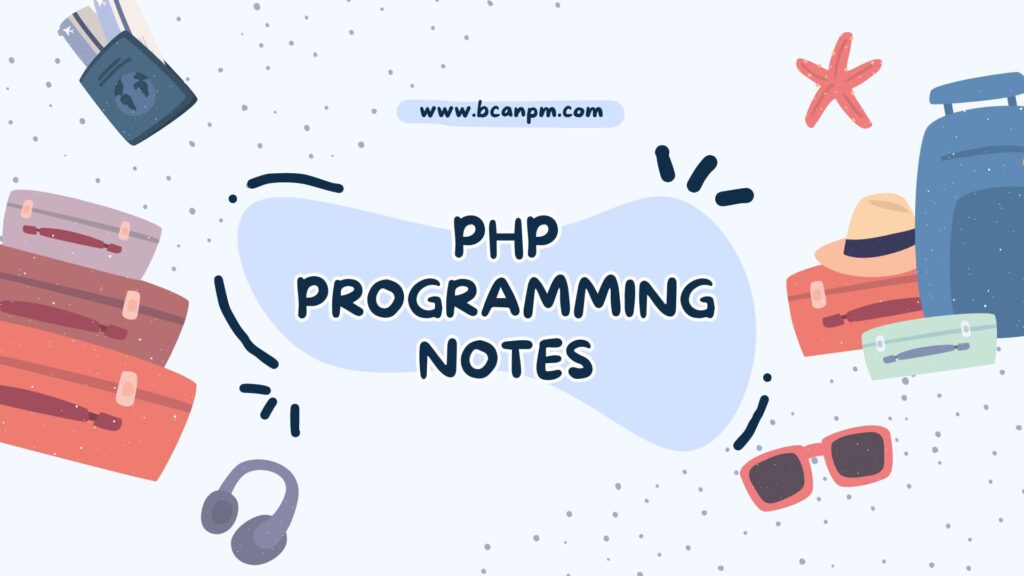
Free Download PHP Programming Notes in pdf – Bca 4th Semester. High quality, well-structured and Standard Notes that are easy to remember.
Welcome to Bcanpm.com
Bcanpm provides standard or well-structured Bca Notes for students. The notes are free to download. Each semester notes of Bca are available on www.bcanpm.com. In this post you can download PHP Programming Notes (SEC 2). All units are available to download for free.
PHP Programming Notes Unit 1 – 11

Unit 1: Introduction to PHP programming
“PHP (Hypertext Preprocessor)” is a widely-used open-source server-side scripting language designed for web development.

Unit 2: Operator, Loops and Array
“Operators, loops, and arrays” are fundamental concepts in programming that enable efficient data manipulation and flow control. Operators perform operations on variables

Unit 3: Classes and Functions
“Classes and functions” are key components of modern programming, particularly in object-oriented programming (OOP).

Unit 4: Working with database
“Working with databases” involves creating, managing, and interacting with structured data using a Database Management System (DBMS).

Unit 5: Working with Frameworks
“Working with frameworks” involves using pre-built, reusable libraries and tools to streamline software development. Frameworks provide a structured environment with predefined functions
Syllabus of PHP Programming
Unit 1: Introduction to PHP
- Overview of PHP: History, features, and advantages of PHP.
- Installation: Setting up a PHP environment (XAMPP, WAMP, or LAMP).
- Basic Syntax: PHP tags, comments, variables, data types, and operators.
- PHP and HTML: Embedding PHP in HTML and vice versa.
Unit 2: Control Structures
- Conditional Statements: if, else, elseif, switch.
- Loops: for, while, do-while, foreach.
- Control Statements: break, continue, exit.
Unit 3: Functions and Arrays
- Functions: Defining and calling functions, function parameters, return values, variable scope, built-in functions.
- Arrays: Indexed arrays, associative arrays, multidimensional arrays, array functions.
Unit 4: Working with Forms
- Form Handling: GET and POST methods, form validation, form processing.
- Form Security: Preventing common security threats like XSS and CSRF.
Unit 5: String Manipulation and Regular Expressions
- String Functions: strlen, strpos, substr, str_replace, etc.
- Regular Expressions: Pattern matching and replacement, using preg_match, preg_replace.
Unit 6: File Handling
- File Operations: Reading and writing files, file pointers, file upload handling.
- File Functions: fopen, fread, fwrite, fclose, file_get_contents, file_put_contents.
Unit 7: PHP and Databases
- Database Connectivity: Connecting to a MySQL database using MySQLi and PDO.
- Executing Queries: SELECT, INSERT, UPDATE, DELETE operations.
- Prepared Statements: Using prepared statements to prevent SQL injection.
- Database Interaction: Fetching data, displaying results, handling errors.
Unit 8: Session and Cookie Management
- Sessions: Starting a session, storing and retrieving session data, session management.
- Cookies: Setting cookies, retrieving cookie values, cookie expiration.
Unit 9: Object-Oriented PHP
- OOP Concepts: Classes, objects, properties, methods, constructors, destructors.
- Inheritance: Extending classes, overriding methods.
- Access Modifiers: Public, private, protected.
- Advanced OOP: Interfaces, abstract classes, traits.
Unit 10: Error Handling and Debugging
- Error Types: Notices, warnings, errors.
- Error Handling: Custom error handling, using try-catch blocks for exception handling.
- Debugging: Using debugging tools and techniques, PHP error logging.
Unit 11: PHP Frameworks and CMS
- Introduction to Frameworks: Overview of popular PHP frameworks like Laravel, Symfony, CodeIgniter.
- Content Management Systems: Introduction to CMS like WordPress, Joomla, and Drupal.
Notes are not properly uploaded,
Please fix it
Thank you for your interest we are working on it